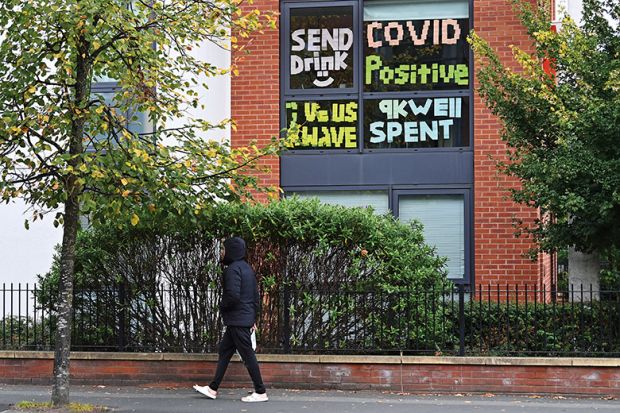The rapid increase in Covid-19 cases among student populations could embitter relations between universities and their local communities, unless the higher education sector works hard to show its worth, it has been warned.
As some UK cities with a strong student presence were set to face stricter coronavirus restrictions, experts said that institutions must do more to demonstrate what they are doing to keep the wider community safe and to play a crucial role in regional economic recovery after the pandemic, or risk losing their neighbours’ goodwill for good.
Data analysis has demonstrated that Covid infection rates among students are running in some cases six or seven times higher than the local authority average.
In Manchester, where more than 1,600 students have tested positive, the city’s five MPs urged the government to spare it tighter restrictions because a large proportion of cases were contained within university accommodation.
Nick Small, a Labour city councillor in Liverpool’s Central ward, where 40 per cent of residents are university students, said that there was a perception that students had caused the Covid-19 infection rate to increase locally and higher education institutions will have to do “a lot more” to build back trust from their local communities.
“It was probably a mistake for universities to reopen face to face and bring lots of students into places like Liverpool. In retrospect universities should have done all learning virtually to students at home,” he said.
“Local communities haven’t always seen the benefits of having universities in their cities and there is a lot of work that needs to be done with universities to look at that civic agenda. Some of that is going on but there is a lot more that needs to be done, particularly in light of Covid and the long-term impacts of that.”
Dominic Nolan, a Conservative councillor in Fife Council’s St Andrews ward, said that over the summer he “frequently heard concerns from local residents that the incoming arrival of thousands of students threatened an increase in Covid cases after many months observing restrictions themselves”. The University of St Andrews’ voluntary lockdown for students as cases peaked “had the right idea of making clear to students that their responsibilities during the pandemic are the same as those for everybody else”.
“Universities have a duty of care to their students but they must also effectively communicate with the local community so we can be confident that everybody is sharing in the sacrifice to get the virus under control,” he said.
John Goddard, professor of universities and cities at the University of Birmingham, said the blame could not be laid solely on universities because not every UK campus had seen such large outbreaks of the virus as Northumbria, Newcastle and Manchester, for example. “These are areas that already had outbreaks. They were already vulnerable,” he said.
However, Professor Goddard said that the message had not always been clear about how much work had been going on behind the scenes with local authorities, the NHS and community groups.
“Perhaps vice-chancellors haven’t been in the media sufficiently speaking about this…saying publicly ‘we are helping communities in rebuilding, we are doing all we can’,” Professor Goddard said.
Andy Westwood, professor of government practice at the University of Manchester, said the pressure from government to take extra students after the row over A-level marking, while needing the money to offset a collapse in international students, had “put huge pressure on ‘civic’ relations”.
Universities now needed to play “an active role in wider civic and public engagement, prioritising left-behind people and places, especially in nearby towns and suburbs, and working much more closely with FE, business, local government in how local economies recover and develop after Covid,” he said.
Lord Kerslake, chair of the UPP Foundation Civic University Commission, said that the pandemic “has brought home the connection between universities and their places, especially those universities that have strong presences in city centres”.
How universities contributed to local recoveries would be crucial, Lord Kerslake said. “It should go beyond the more established ways of working, with science for example,” he said. “It’s helping with employment, helping with stimulus packages for those most affected, and those are still a work in progress.
“Universities will have to push themselves beyond their obvious comfort zones into how they work together [with local communities] in all aspects, not just the ones that might suit the universities.
“In a certain sense the biggest challenges are those to come.”
POSTSCRIPT:
Print headline: Campus case surge risks ‘town-gown relations’
Register to continue
Why register?
- Registration is free and only takes a moment
- Once registered, you can read 3 articles a month
- Sign up for our newsletter
Subscribe
Or subscribe for unlimited access to:
- Unlimited access to news, views, insights & reviews
- Digital editions
- Digital access to THE’s university and college rankings analysis
Already registered or a current subscriber? Login









